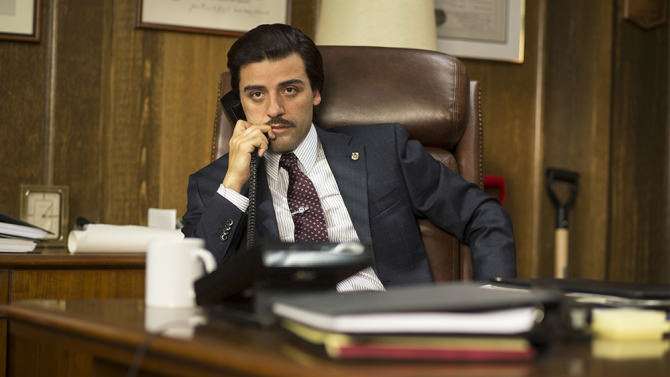Show Me a Hero: Fear and Loathing in Yonkers
Public housing politics takes center stage in David Simon's new HBO miniseries.


The title of HBO's new miniseries Show Me a Hero comes from F. Scott Fitzgerald's aphorism, "Show me a hero and I'll write you a tragedy." As a vehicle for tales of either heroism or tragedy, the 27-year battle over public housing between a federal judge and the city of Yonkers, New York, seems an unlikely choice. Pockmarked by venal double-dealing on one side and imperial overreach on the other, it was the Vietnam of social engineering, achieving little beyond a high political body count and a morass of red financial ink.
But where others see the tedium of a poli-sci public administration lecture, David Simon, whose career has been built from dramatizing urban dysfunction in series like The Wire and Treme, sees opportunity. He has seized it again with Show Me a Hero, somehow constructing an absorbing drama from the outtakes of a public-access television show.
Show Me a Hero concentrates on the most volatile five years of the clash between Yonkers and U.S. District Court Judge Leonard B. Sand. In 1987, the judge, weary of the city's stalling in the face of his order to build 200 units of public housing on its predominantly white and middle-class west side, ordered the Yonkers City Council to get the project under way or face escalating fines that would quickly reach $1 million a day and bankrupt the city within three weeks. Making it clear that the case had gone beyond politics or policy wonkery, the judge also fined any council member who voted against the housing.
In the middle of this mess is the just-elected youngest mayor in America, 28-year-year-old Nick Wasicsko (Oscar Isaac, Inside Llewyn Davis). Wasicsko had been a lightweight city councilman who ran against a six-term incumbent mayor with whom he voted more than 90 percent of the time for no reason except pure ambition. He won a purely accidental victory when voters discovered one of the few things upon which the two men disagreed: Wasicsko wanted to appeal Judge Sand's decision, while the mayor thought that response was legally hopeless.
Soon after Wasicsko takes office, the appeal is denied, and the city's lawyers say further appeal is a waste of money and will only further antagonize Judge Sand. To Wasicsko, the next step is obvious—the city should grit its teeth and start building the housing, rather than risk bankruptcy. To his surprise, the voters he riled up against the old mayor now want the new mayor's blood and his old political allies suddenly can't come to the phone. As his career dissolves into a mélange of city hall brawls and backstabs punctuated with chillingly authentic death threats (a bullet arrives in the mail accompanied by the message: "You won't see the next one"), Wasicsko broodingly inquires of a colleague: "Hey, this mayor thing—when's the fun part?"
Simon's trademark is selling his sometimes acute and sometimes balmy urban critiques (he appears to regard the New Deal as the apogee of Western civilization) by peopling them with affecting characters. Wasicsko, played by Isaac with an easy, winning charm that devolves into loonbat paranoia as he sees first his career and then his life being devoured by the beast he's awakened, is one such. (Though Wasicsko, in the end, was undone by his own overweening ambition as much as anything else.)
His story is sandwiched by those of four women—three who live in the projects, one who protests them—who serve as reminders that what may seem like bloodless institutions when you read about them in the paper are actually collections of living, breathing humans. Catherine Keener is particularly poignant as the white anti-project activist who belatedly realizes that for many of her allies, the fight is not really about crime or property values but race.
To the extent that Show Me a Hero is flawed, the problem lies not in Simon's dramaturgy but his journalistic instincts. Show Me a Hero is but a single snapshot of a lumbering crisis that unfolded over a period of nearly three decades, and while the show's narrative is painstakingly accurate within its timeframe, its wide implications are not.
For one thing, the lawsuit at the heart of the housing battle was not about segregated housing but segregated schools. Judge Sand took a relatively limited problem with which the federal judiciary had considerable experience and expanded it into a breathtakingly massive social-engineering scheme in which low-income housing projects were used as a battering ram against middle-class residential patterns that had developed over a century or more. To further complicate matters, Yonkers effectively placed its own neck on the chopping block by accepting federal grants for years that required the construction of low-income housing, but never actually built any. The case fundamentally revolved not around racial egalitarianism but a simple accusation of breach-of-contract.
If the case lacked the sharp moral boundaries that Simon favors, its outcome was even more blurry. The housing projects were eventually built. (Oh, come on, did I really have to say "spoiler alert"?) As their advocates proclaimed, Yonkers did not fall into ruins; but, as their opponents warned, neither did they achieve a racial utopia or even offer much progress at all.
Simon should have paid more attention to the conclusion of Lisa Belkin, the former New York Times reporter who wrote the book upon which Show Me a Hero is based. "A judge can mandate housing remedies, but he cannot mandate a sense of belonging or an essence of neighborhood," she wrote. "Yonkers is not integrated. Black and white are not woven into the same fabric." In the end, all that happened was that 200 housing units moved across a river that divides a city of 200,000. As you watch Show Me a Hero, ask yourself if that was worth the price Nick Wasicsko paid.
Show Me A Hero. HBO. Sunday, August 16, 8 p.m. EDT.
Editor's Note: As of February 29, 2024, commenting privileges on reason.com posts are limited to Reason Plus subscribers. Past commenters are grandfathered in for a temporary period. Subscribe here to preserve your ability to comment. Your Reason Plus subscription also gives you an ad-free version of reason.com, along with full access to the digital edition and archives of Reason magazine. We request that comments be civil and on-topic. We do not moderate or assume any responsibility for comments, which are owned by the readers who post them. Comments do not represent the views of reason.com or Reason Foundation. We reserve the right to delete any comment and ban commenters for any reason at any time. Comments may only be edited within 5 minutes of posting. Report abuses.
Please to post comments


in the span of my adult life, the Liberal Intellectual Radical Progressive Left has become the political and social establishment. While doing so, they have engaged on large scale social engineering projects that - they claim - should have reduced poverty and made racism a thing of the past. Real outcome? The majority of brown people are mired in the welfare state, and racism is, if anything - worse (white racism against brown is down. Brown against white? suicidally high).
Either these LIRPs are deliberately trying to create a miserable and exploited permanent underclass, or they are idiots.
Or both.
Start making cash right now... Get more time with your family by doing jobs that only require for you to have a computer and an internet access and you can have that at your home. Start bringing up to $8596 a month. I've started this job and I've never been happier and now I am sharing it with you, so you can try it too. You can check it out here...
http://www.incomereport.tk
The idea that mixed income housing will bring the races together is a fantasy. Self segregation happens when races are mixed. I work for a large, and painstakingly diverse, company, and when we're out on the "floor" we all work together. But in our break room, blacks sit with blacks, Asians sit with Asians, Hispanics sit with Hispanics, and speak exclusively in spanish. The one thing that brings them all together is football on the tv.
I wonder if part of the reason for this show is that a similar proposal has been considered, and is now being potentially regulated, on a nationwide basis (expanding public housing into middle-class neighborhoods).
It's not potential, they're doing it more aggressively as one of Obama's "it's my presidency and I'll do what I want to" period before he leaves. it has an acronym, and its something like "Affirmatively Pushing this stuff forward right now before I leave office." Kidding about the name, except I think "Affirmatively" is in there. It's why Ferguson blew up-the tenement where the riots all start used to be section 8 apartments in the poorest part of town. The idea is, move inner city blacks to non black suburbs. Its an old idea, Obama is just stepping up the tempo.
Google pay 97$ per hour my last pay check was $8500 working 1o hours a week online. My younger brother friend has been averaging 12k for months now and he works about 22 hours a week. I cant believe how easy it was once I tried it out.
This is wha- I do...... ?????? http://www.online-jobs9.com
Excuse me, but a judge ordering elected officials to vote a certain way?
WHAT???
They had a choice. They could have chosen to vote the way they wanted and gone to prison.
Start making cash right now... Get more time with your family by doing jobs that only require for you to have a computer and an internet access and you can have that at your home. Start bringing up to $8596 a month. I've started this job and I've never been happier and now I am sharing it with you, so you can try it too. You can check it out here...
http://www.jobnet10.com
Start making cash right now... Get more time with your family by doing jobs that only require for you to have a computer and an internet access and you can have that at your home. Start bringing up to $8596 a month. I've started this job and I've never been happier and now I am sharing it with you, so you can try it too. You can check it out here...
http://www.jobnet10.com
Start working at home with Google! It's by-far the best job I've had. Last Wednesday I got a brand new BMW since getting a check for $6474 this - 4 weeks past. I began this 8-months ago and immediately was bringing home at least $77 per hour. I work through this link, go? to tech tab for work detail,,,,,,,
http://www.Careersonline10.tk
One of the things that stuck in a lot of people's craw was a judge, who lived in a lily white neighborhood, demanding that Yonkers add even more public housing.
As someone who lived in the Schlobohm housing projects I can see how the area has declined and why residents did not want more of the same.
Google pay 97$ per hour my last pay check was $8500 working 1o hours a week online. My younger brother friend has been averaging 12k for months now and he works about 22 hours a week. I cant believe how easy it was once I tried it out.
This is wha- I do...... ?????? http://www.online-jobs9.com